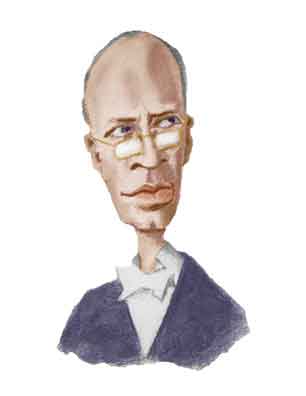
Sergei Prokofiev
Returned to the wrong time at the wrong time.
Sergei Prokofiev, Dmitri Shostakovich, and a Delightful and Merry History of Soviet Music
(Or Was America's Favorite Kids' Tune Written for One of the Worst Dictators in History?)
A Most Merry and Illustrated History of Soviet Music

Sergei Prokofiev
Returned to the wrong time at the wrong time.
Walk up to your Average Man or Woman on the Street and say, "Prokofiev! Shostakovich!" Then wait for their response.
Now if they say "Gesundheit!", just say "Thank you" and keep on walking. If they scream for a cop, say your were joking. But if they smile, point a finger in the air, and with hand upon breast say, "Ah, Prokofiev! Shostakovich!", then you've found a fan of Russian music.
Of course, for most of the Twentieth Century, Russian music was the same as SOVIET music. Or at least that's what the Soviet authorities though it SHOULD be. But composers like Prokofiev and Shostakovich didn't always agree, and naturally this caused problems for everybody.
Today - among the eggheads, at least - Dmitri (Shostakovich) has possibly edged Sergei (Prokofiev) out as the World's Greatest Soviet Composer. Never mind that if you stop your average Joe Blow on the street, it's a good bet he's never heard anything Dmitri wrote. But that won't be true for Sergei. Everyone - and that means, EVERYONE - has heard at least one of Sergei's songs. In 1936, he wrote "Peter and the Wolf", which is surely one of the most famous orchestral tunes ever written and has long been the staple used to introduce kids to the modern symphony orchestra.
But you have to wonder. How many kids realized - particularly those who grew up before the fall of the Soviet Union and those who remember the heyday of the Cold War (Khruschev's "We Will Bury You!" era) - that they were listening to a song that was actually COMMISSIONED BY THE COMMIES! Yes, Virginia, Sergei was asked write a "children's symphony" by the Central Children's' Theater. Naturally the theater and its commissions were officially sanctioned by the Soviet government, and as we'll learn later, a government that fully expected the composers who collected government sponsored rubles to keep their songs within very rigid ideological boundaries. In four days, Prokofiev had hammered out "Peter and the Wolf".
Although it's popular now, at the time it was a flop. And even considering it was written for kids, it was not really the type of song that Sergei liked doing. In his earlier days, he had written what can mostly be considered "modern" music. Almost avant-garde, it was atonal, dissonant ("Dis an ant? Naw, dat's a fly!"), and at times a bit hard to listen to.
So if "Peter" isn't your typical Prokofiev, a question remains (to people who worry about those things). WAS "Peter" deliberately written with its Russian folk theme and catchy, foot-tapping melodies specifically to toe the line with a government that more and more was telling composers just they could and couldn't write? A government, by the way, that was being run by one of the worst tyrants in the history of the world?
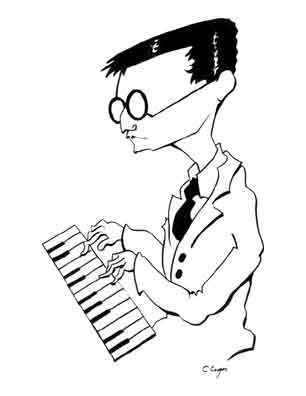
Dmitri Shostokovich
Perhaps eclipsing Sergei.
Sergei himself was a musical wunderkind who by the time he entered the St. Petersburg Conservatory in 1904 had written four operas, two sonatas, a symphony, and a lot of piano pieces. And that's just what he brought to show the teachers! Obviously he was a kid who had ample time on his hands, and he did NOT come from a poor downtrodden peasant family. Au contraire (as they say), his dad was a prosperous landowner complete with peasants working on the farm.
Only thirteen at the time when he entered the conservatory, Sergei was soon known as a brilliant student, highly gifted on the piano, and a pain in the rear end. On graduation (ten years later), he even had the gall to play one of his own pieces in the final piano competition. He won even though most of the teachers didn't like his songs.
Dmitri was born on September 25, 1906 so was Sergei's junior by fifteen years. He was also highly gifted musically and like Sergei, attended the St. Petersburg Conservatory. Although on the surface not the prodigy that Sergei was, Dmitri's rise to official recognition (not to mention monetary success) was astronomical. Within a year of his graduation in 1926, his First Symphony was being played by Bruno Walter and the Berlin Philharmonic - not a bad honor for a student graduation piece. He quickly became known as an important and progressive - and at times avant-garde - composer.
While he was alive (and for years after his death), Dmitri was considered a true believer in the Soviet System. This wasn't just from his (apparent) willingness to grind out the occasional "Hail, Motherland!" songs demanded of Soviet composers. Dmitri himself also contributed to the impression. On his last visit to America in 1973 (where he received an honorary degree from Northwestern University), scorn for Russia's increasingly vocal dissidents fell from his lips (or at least the papers reported they did). Sergei, too, was suspected of American conservatives of being sincere and willing tool of the socialists. After all, here was one of the few artists who left the Soviet Union only to return entirely of his own free will. Of course, neither Dmitri's statements nor Sergei's prodigal return meant ivan-govno, but somehow Americans, who always were quick to trumpet how there was no free speech in the USSR, never quite got it.
For "Dmitri" (note quotes) to issue political statements meant nothing in a country where public figures' names were splashed on official statements they never read, much less signed. That certainly happened to Shostakovich, as well as to poet and novelist, Boris Pasternak who did quite a bit more than just write "Dr. Zhivago". Even though they might try to avoid signing a statement supporting objectionable policy (Shostakovich went out for a walk when they once brought a letter over) or they might even refuse outright (like Pasternak did), still you could bet when the letter showed up in Pravda, their names would be plastered there right along with the others who really DID sign. If they didn't like it (to quote the famous Russian proverb) well, comrade, that was just tough tiddy.
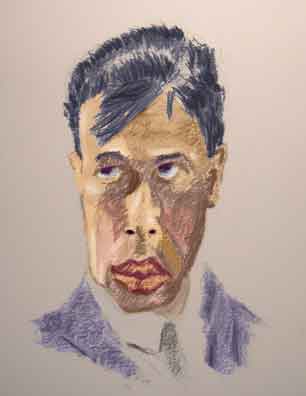
Boris Pasternak
He did more than write Dr. Zhivago.
For Sergei to leave and return to Russia wasn't really all that strange, either. In the early years after the Bolshevik Revolution, art, music, and theater in the Soviet Union were pretty much left alone, and Russian artists were among the most progressive in the world. By the time Sergei graduated, Stravinsky was already established as one of the most important and original composers in history. No doubt being impressed at how Igor had made it big by leaving Russia, Sergei followed suit. Between 1914 and 1936, Prokofiev began traveling over the world. He lived mostly in Europe but spent some time in Land of the Free and the Home of the Buck.
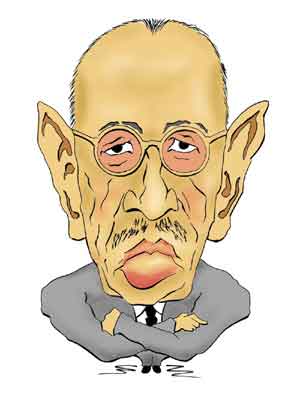
Igor Stravinsky
He left Russia to make it big.
Although everyone began hailing Sergei as a musical genius, he himself didn't care much for the West. In Russia the arts were a very real part of the country's culture. Not so in the America. There you had ragtime (ugh), jazz, (officially frowned on in Russia, but not rabidly suppressed due to its popularity), and although Sergei didn't live to see it, soon after the century hit the midpoint the American "masses" were watching a country bumpkin from Tupelo, Mississippi prance around onstage and wiggle his hips while teenage girls shrieked and salivated (double ugh).
What there was of "great art" in America was mostly an idiosyncratic affectation of the rich. You only knew you were a great artiste if Peggy Guggenheim bought one of your pictures. It didn't help Sergei's opinion of the West that he couldn't make much of a living. When he left the US to sail back to Europe he was in the same state as he arrived - flat broke.
Exactly when Sergei left and returned to Russia is a bit unclear. Or rather, both events are a matter of definition. His first trip to Europe was in 1914, but he soon went back home to catch the Bolshevik revolution. It was in 1918 (before things got settled) when he left once more and began his wanderings through Europe and America. In 1923 he met his soon-to-be wife, Carolina Codina, who was a young Spanish singer who performed under the professional name of Lina Llubera (her friends seem to have called her Lina). At first it seems to have been a happy enough marriage, but as was the vogue among the more artsy types, it was reasonably open (as was Shostakovich's first marriage to the feisty and liberated Nina Vazar).
Some articles say Sergei returned home in 1932; others say 1934, and still others put it as late as 1936. The truth is it's really pretty arbitrary whether you say he was living in Europe and frequently visiting Russia or living in Russia and frequently visiting Europe.
But trying to decide the year of Sergei's return is important in interpreting what went on in his music. What IS known is that the years when Sergei got back - the 1930's - is when Russia's ruler, Iosif Vissarionovich Dzhugashvili (who thankfully for English speakers adopted the name of Stalin), really began to lose it. Or perhaps we should say that's when he began to get it all together.
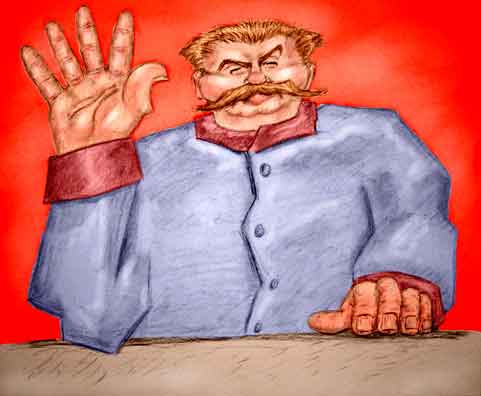
Mr. Dzhugashvili
For those who prefer Russian.
Most people look on Uncle Joe as a bonafide nut case who couldn't distinguish between people who really DID want to knock him off or people like Vsevolod Meyerhold who did nothing worse than put on plays Joe didn't like. Although it's hard to believe that someone who massacred as much as thirty million of his fellow countrymen wasn't crazy, Joe was probably not nuts in any clinical sense.
A former divinity student, Stalin was not the unlettered yokel he's sometimes pictured as being. A compulsive workaholic Joe would spend sixteen to eighteen hours a day at his desk, partly (believe it or not) because he wanted to set a good example. More to the point, he had a real appreciation for education, and he particularly loved music, and he let musicians get away with something that he would never have tolerated in others. His favorite pianist was Maria Yudina. Joe loved her playing even though she never made any bones about being a staunch opponent of Soviet communism.
There's the story that Joe once heard Maria play and wrote her a note of appreciation and included a generous quantity of rubles. She wrote him a thank you note where she said she was giving the money to the church and prayed that God would forgive him his great crimes. For anyone else, that would have been a death sentence. But Stalin pretty much left her alone and never lost his admiration for her playing.
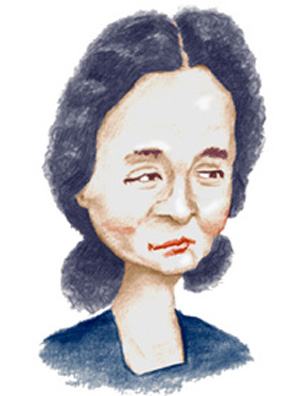
Maria Yudina
Stalin's favorite pianist.
Perhaps the best way to think of Uncle Joe is as a ruthless, murderous, and consciousless sukin syn with an incredibly farseeing vision. He was well versed in Russian history, and perhaps thinking Tsar Nicholas I (who was also a sukin syn) had been on the right tack, Joe decided he wanted see a Russia that would do a hey-presto! change from a country full of repressed and downtrodden peasants to a fully modernized industrialized state. Rather than slave away on the farms of the landed bourgeoisie, they would be factory workers, backbones of the new Soviet state, laboring contentedly during the day and going home at night to warm, happy homes where at their generous but not ostentatious dinners they would all drink vodka toasts to their benevolent Father Iosef Vissarionovich. But, unlike Nicholas' grandfather, Peter the Great, Joe (as did Nicholas) wanted to keep foreigners and he contaminating influence OUT.
You could NOT, Joe thought, put such a grand scheme into action unless the people in the country were well educated. That didn't mean just creating state schools along with massive collective farms and the government controlling all the heavy industries (although he did all that, too). It also meant having an art and music that would be accessible and enjoyed by the average person. That is, you needed art for the "masses". So what to do?
Simple. By 1932, all Soviet artists - writers, painters, sculptors, AND musicians - were reorganized into their own state-run unions. In Russian, such a formal government-directed reorganization is called perestroika, which ironically most Westerners associate with the fall of communism.
Within two years, that is, by 1934, the government (sc. Stalin) had officially adopted the concept of "Socialist Realism" as the defining guideline of Soviet art. Mostly it meant pictures had to look like pictures, sculpture had to look like sculpture, and music had to sound like music. No paintings which look like blank canvases; no sculpture which were mason jars sitting on the floor, and certainly no musical compositions with repetitive choppy twelve note chords that made people look at their watches and say, "And for five kopecks I'm listening to THIS?"
Now you can see the timing issue regarding Sergei. If he returned in 1936 (when he wrote "Peter and the Wolf") that was AFTER the adoption of Socialist Realism and coming back to Russia was his own choice. Then you can say, well, "Peter and the Wolf" with its pleasant melodies and ear-friendly harmonies was (as it's sometimes put) just his "natural progression" as a composer. But if you believe he returned in 1932, then you can say with a jibe and sneer that anyone who wrote a song like "Peter" with it's Russian folk plot and whistlable and toe tapping themes after he had been hobnobbing with Stravinsky and his crowd for fifteeen years was clearly just trying kiss Uncle Joe's socialistic realistic rear end.
A somewhat less pejorative (and more accurate) assessment is that far from kissing Joe's rear end, Sergei may have just been trying to SAVE his OWN - and that of his friends and his family. When we say Joe was a sukin syn, we mean it. The 1930's was the era of the Purge and the Gulag. People disappeared for doing nothing more than inadvertently writing a story, poem, or play that Stalin didn't cotton to. Some did less than that - like KNOWING someone that had inadvertently writing a story, poem, or play that Stalin didn't cotton to. And there was nothing you could do about it. Russian Love it or Leave It? You COULDN'T leave it.
So writers and artists (and anyone else) were pretty much stuck. Although the arts did operate with a surprising degree of free enterprise at the time (Shostakovich preferred to find his own commissions than get handouts from the state), the theater and arts were VERY heavily subsidized. In one way or another, to get paid composers had to produce at least SOMETHING that the government thought was OK.
Now that doesn't mean that all Soviet composers thought they should be handed the rubles by composing just what they wanted. Where Sergei (and most composers) differed from the authorities was that they should NEVER experiment with new harmonies and melodic lines or that modern music was a subversive evil. A number of famous Soviet composers with quite the western vogue like Aram Khachaturian (of "Saber Dance" fame) and Dmitri Kabalevsky ("Colas Breugnon") were, so it's said, honest believers in socialism, although in Aram's case it didn't help.
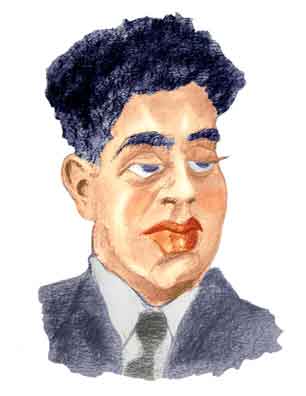
Aram Khachaturian
A firm believer in Soviet Communism (and it didn't help).
Today when even the commies don't like Communism, it's easy to forget that for a good chunk of the Twentieth Century a lot of people approved of the basic ideas of socialism. That was, after all, the era before it was believed that decent health care and adequate pensions should be limited to corporate executive officers, professional sports stars, and US Senators and Congressmen. Artists contributing to the government's idea of art for the everyday worker was often done through conviction, not opportunism. So although "Peter and the Wolf" was written with the idea of pomoting honest Soviet values, it's also likely the actual music WAS written as it was because that's what Sergei wanted. In the mid-1930's many Russian composers thought they could be original and bold and still get official sanction.
One problem, of course, was that what was deemed good and bad Soviet music was not evident until AFTER you wrote it. Or rather, you didn't know if it was good or bad until after it was PERFORMED. Worse, what was good at one point, might later become bad later. This can be no better illustrated than by what happened to Shostakovich when in 1934 he put on his opera, "Lady Macbeth of Minsk".
Based on a story of one of Russia's favorite authors, the show was a smash from the first. Better yet, it got rave reviews in the press. This supported Dmitri's contention that the work was in full accord with Soviet artistic guidelines since it showed how women could be victimized by the brutal male-dominated culture of Tsarist Russia. In the course of the opera, Katerina Izmailova ("The Lady Macbeth" of "The Lady Macbeth of Minsk") killed off off her husband, her father-in-law, and her husband's cousin in short order, all to the accompaniment of heaving pounding music which fit one scene perfectly when Katerina and her partner in crime, a husky hired hand named Sergei, made whoopee beneath a canopied bed. Socially realistic or not, this was NOT an opera of traditional Russian Family Values, let me tell you. Popular both in Russia and abroad, everyone (with some exceptions, such as Stravinsky) loved it. It had gone through 200 performances and Shostakovich, just turning thirty, was an hailed as an international musical genius.
Then in 1936, Stalin went to see it. He hated it.
Oops.
Without doubt one of the most famous articles in the history of music was the Pravda review of "Lady MacBeth of Minsk". It appeared on January 28, 1936 . Titled "Chaos [or Muddle], Not Music", some historians have attributed the article to Stalin himself. That's certainly possible, as the tone does have the charming light hearted touch of Uncle Joe, particularly about halfway through the article where the author (whoever it was) warns "this may end very badly". Then ten days later Dmitri's ballet "The Limpid Steam" was similarly trashed.
So began Dmitri's usual two-pronged response to the government attacks. First he would respond with a composition that was more or less in tune [no joke intended] with the the Party line. In this case, he yanked his Fourth Symphony (which was written before the Pravda articles) and penned his Fifth Symphony which was subtitled "A Soviet Artist's Response to Just Criticism", a subtitle, by the way, that was not Dmitri's.
Then once the bouquets were thrown and Dmitri was again hailed as a True Son of Soviet Realism, he'd go and write something that left the Soviet officials scratching their heads and wondering "What the hey?" For instance during the war - when he produced the patriotic Seventh "Leningrad" Symphony, followed by the ponderous Eighth ("Stalingrad"), he'd then fire off his bouncy happy Ninth once the war was over. This got the official critics grumping that the defeat of the Nazi's shouldn't be celebrated by such a cheerful composition. During the Cold War Americans liked to cite these reviews as proving how the nasty Commies controlled art and music in Russia. It's sometimes forgotten that at the time, some American critics said the same thing about Dmitri's Ninth.
People who look on Dmitri's tactics as rather lame (such as today's Americans whose major dilemma seems to be deciding whether to watch Spike TV or listen to Howard Stern) need to remember that until Stalin died, Dmitri never knew if he would be arrested, imprisoned, or worse, just for writing music the damn politicians didn't like. Some of Dmitri's friends, including an early mentor, theater director and impresario, Vsevolod Meyerhold, DID end up in the "worse" category. Also among Stalin's more despicable traits were to target family members rather than the offending principals. Both Dmitri's sister, brother-in-law, AND his mother-in-law were arrested by the NKVD (one of the many precursors to the later KGB) and sent to prison camps.
It seems hard to believe things could get worse. But they did. In 1948, Stalin's buddy, henchman, and watchdog of Soviet culture, Andrew Zhdanov, appointed a new kid on the block to become the Official Honcho of Soviet Composers.
Ask your office egghead if he knows who Shostakovich is and he probably will. Ask him if he knows Prokofiev, and he'll sneer that you have the gall to ask. But ask him who Tihkon Khrennikov is and he'll say, oh, yeah, wasn't he the first guy the Russians launched into space?

Tikhon Khrennikov
The Big Bad Wolf of Soviet Music.
Actually, Tihkon Khrennikov is the Big Bad Wolf of Soviet music. Only thirty-five in 1948, one of the first things he did in his new job was to stand up in front of the meeting of the Soviet Composer's Union and trash the music of Prokofiev, Shostakovich, and Katchaturian as "formalist" and "anti-democratic". Here "anti-democratic" is used more in the sense of "anti-popular" or "anti-people". "Anti-working class" would be the stereotypical phrase.
Formalist, on the other hand, IS a bonafide art term. It just means someone who thinks the FORM of art should predominate over any message. Some artists say that's good; art for art's sake, and all that. But in Russia, it meant Stalin didn't like it. And that was bad.
Now Tikhon just LOOKED like a bad guy. Sporting a pugnacious square jawed face, he looked more like a heavy in a gangster B-movie than a composer. But his credentials were real enough - even distinguished - and his music was and remains genuinely popular in Russia. What comes as a shock is when you listen to some of Tikhon's compositions and how modern it sounds. With his unusual rhythms, harmonies, and melodies, he certainly doesn't sound any less "formalistic" than music of Aram and Sergei and Dmitri.
Tikhon continued to be a powerhouse in Soviet music long after Stalin died, and he was the guy that always ran the Tchaikovsky Competitions up to the end of the Twentieth Century. With the fall of the Soviet Union the job of Watchdog of All Proper Music vanished, but Tikhon continued to compose in affluent retirement. And he's was honored even outside Russia. In 2003 he was awarded with the Mozart Prize presented by UNESCO.
Sergei wasn't so lucky. He suffered several heart attacks and after the 1948 denouncement he had a stroke. By 1950, he was earning virtually nothing and when the young cellist, Mstislav Rostropovich, came for a visit, he found the aging and ill composer sitting his apartment. Now according to one story, Sergei didn't have enough money to buy food and according to another, he didn't have enough money to pay his cook. In any case, Mstislav stormed in on Tikhon and made him dig down in his own pocket (or actually the union funds) and give some rubles to Sergei.
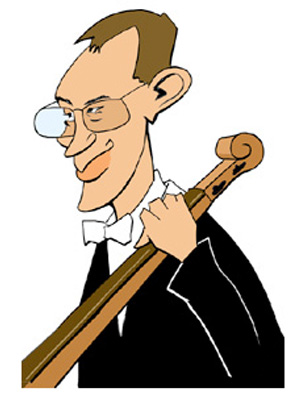
Mitslav Rostropovich
Definitely NOT Stalin's favorite cellist.
Maria Yudina lived until 1970 wed only to her music, her church, and her cats. She remained one of the most popular pianists in Russia. Shostakovich seemed to be able to bounce back when his songs were trashed and he died in 1975 full of Soviet and Western honors. Khachaturian lived until 1978.
Mstislav Rostropovich remained in the Soveit Union, a constant and very vocal gadfly to the Communists, and he left with his family in the mid-1970's mainly because the government pretty much made it impossible for him to perform. While abroad his Soviet citizenship was revoked, and he continued to be one of the most vocal opponents to how the Soviet - or any government - restricted the arts and human rights. In 1990 he regained his Soviet citizenship without compromising any of his principles. He died in 2007 and was buried in Moscow's Novodevichye Cemetery.
Tikhon followed a few months later at age 94 Although he always tended to shout at interviewers who brought the topic up, he always maintained that he was no different than the guys he denounced. After all, Prokofiev and Shostakovich would be quick to toe the line when they were trashed and snapped back with a generous number of Soviet and realistic songs. Tikhon claimed that even more than Sergei and Dmitri, he was forced to do what he was told to do by Uncle Joe. Things weren't also always so smooth with Tikhon and the Great Grey Father, either. According to "Testimony", the - quote - "memoirs" - unquote - of Shostakovich (which Dmitri probably didn't even read, much less write), Tikhon spoiled his pantaloons when he made a comment to Stalin and Uncle Joe turned and looked at him with THAT kind of look. It's a good story even if it isn't true.
But Sergei's story doesn't have a very happy ending. According to one telling, in 1948, along with all his other problems, his marriage to Lina was declared null and void since she was a foreigner (a forbidden marriage by a new Soviet law). He was forced to marry Mira Mendelson, a much younger (and attractive) Russian woman. Still, Mira took very good care of Sergei, and it was a happy enough marriage.
The actual story is a bit more complicated. First, Sergei had left Lina around 1941 and had already moved in with Mira. He never bothered filing for divorce, partly it seems, to protect Lina and the kids, but partly because it didn't really matter. During the war the Soviet bureaucracy was in such shambles that there were no real records as to who was married to who. But then once the state had time to worry about such things, people who were married had to reregister to document their previous nuptials. So rather than re-affirm he was married to Lina, he and Mira registered as Mr. and Mrs. Prokofiev. By that time most of his friends looked on Sergei and Mira as man and wife anyway.
This would not have necessarily left Lina and the kids high and dry, as Sergei still did his best to support them. But this was still the Soviet Union and Stalin was still in charge. Finally, in a rather strange and confusing episode Lina was picked up at the Moscow train station and hauled to Lubyanka prison. Shortly afterwards she was shipped to a Siberia prison camp for spying.
The only rational reason (if you want to call it that) is why Lina could have been imprisoned was to make sure Sergei continued to stay in step with Uncle Joe. How much Sergei tried to help get Lina free is disputed, but in practical terms, the only way he could help her was, well, just to stay in step with Uncle Joe.
As for the two kids, Sviatoslav and Oleg, by then both were relatively independent young men (Oleg was twenty, and Sviatoslav was twenty-two). Even so, Sergei certainly wasn't going to cut them off. Surprisingly, Lina survived and returned to Moscow after Stalin died. That she, Oleg, and Sviatoslav believed Sergei did all he could to help them is most evident in that they remained the staunchest supporters of his music.
Both Oleg and Sviatoslav managed to achieve productive and successful AND artistic careers in their own right. Oleg became an artist and sculptor and Sviatoslav ended up (like his dad) as a composer. Oleg died in 1998 and Sviatoslav is at the time of this writing still alive and well. Lina finally left Russia in 1972, and lived until 1989, just long enough to see that the old Soviet Union was just about to come a-tumbling down.
As for Sergei, he died on March 5, 1953, just shy of his sixty-second birthday. Real history buffs like to point out that's the same day Stalin died. So Sergei didn't outlast Joe. On the contrary, he died about an hour earlier.
But in the end, it really doesn't matter why Prokofiev wrote "Peter and the Wolf". It would have been the same classic even if it had have been written for Moon Unit Zappa by Mother Frank (who probably would have had the string section burp out their parts). It's been played literally by hundreds of orchestras, and narrated by people from humble speech teachers to Presidents of the United States. Perhaps the best narration is the one by David Bowie with Eugene Ormandy and the Philadelphia Orchestra.
Hanh?
Socialist Realism in the hands of Ziggy Stardust?
Yep. If Uncle Joe were alive, he'd be turning over in his grave.
References, Bibliography, and Additional Reading
It's a comment on the state of music in America (or education in general) that books about Prokofiev and Shostakovich are about as abundant and cheap as you can imagine. Books can go for a buck or two which is a heck of a lot cheaper than a monthly cable connection. If you find a book that is expensive, look around a bit more. You can almost surely find a cheaper copy.
"Sergei Prokofiev a Biography", Harlow Robinson, Paragon House, 1988. One of the recent standard biographies. Pretty good actually but the time after his return to Russia is a surprisingly small part of the book.
"Sergei Prokofiev: A Soviet Tragedy; The Case of Sergei Prokofiev, His Life & Work, His Critics, and His Executioners", Victor Seroff, Taplinger Publishing Company, New York Co, 1979 (reprint of 1969 edition), Written at the height of the Cold War. It tells it like it was but is a bit preachy.
"Testimony: The Memoirs of Dmitri Shostakovich", Solomon Volkov (either author or editor, depending on your point of view). Harper and Row, 1979. One of the most controversial books about a composer ever written, it was snuck out of Russia and shocked the Western world when published in 1979. Suddenly Dmitri wasn't a "true believer in the Communist system" (as his obituaries said) . Instead he was a secret dissident who hated communism and his compositions have all sorts of subliminal musical messages that he despised the Soviet system. Naturally the Soviet authorities denounced the book was a fraud.

Laurel and Solomon
Duking it out in the Shostokovich Wars
According to Solomon, he met many times with Dmitri. But Dmitri was a taciturn informant. To get information, Solomon had to ask specific questions, and Dmitri would respond in brief answers. Solomon would catch everything down in "a kind of a shorthand" and then go back home and recast the answers into a coherent continuous narrative. He'd take it back to Dmitri who would read the typed pages and approve them by signing the first page of each chapter.
Unfortunately it has recently been shown by historian and musicologist Laurel Fay that the only pages in the manuscript with Dmitri's signature are nothing more than text from old previously published essays that Dmitri wrote as long ago as 1927. The pages contain the the original punctuation, and on the following page they miraculously switch to wording not in the original essays, which, by the way had all been previously published in Russia. So all Solomon can show is that he has pages of Shostakovich's signature on writings that had already had the Good Housekeeping Seal of Soviet Approval.
What's worse is whenever the pages/cum signature sometimes break off in mid-sentence, the next page continues with new words that are NOT from the published essay. Controversial material occurs only when Dmitri's signature no longer graces the page. Even more telling is that in the previously published material there are some sentences that would allow the timing of the writing to be deduced. These were whited out in the "Testimony" typescript.
But wait, some have said. Page 1 of Chapter One has a scathing trashing of Soviet life (where Dmitri talks about "mounds of corpses") and remember, the first pages of the chapters had Dmitri's signature.
Uh, sorry. When Laurel finally was able to examine the typescript, it turned out THAT first page had no signature. You had to go to Page 3, Chapter 1 to see the familiar D. Shostakovich scrawl. And what's on page 3? A page from a previously published essay. And more to the point the first line of the page is dropped down a bit which is the way first pages of manuscripts are usually spaced.
Shostakovich scholarship is now pretty much divided into a pro- and anti- Volkovian camps. The arguments can get downright nasty, and the anti-Volkovians believe the book is fabricated. It looks for the world like Solomon (as an editor of Svetskaya muzyka) had Dmitri sign pages of earlier (and approved) previously published essays for some editorial reason and then wrote the rest of the stuff on his own skillfully interweaving the before-and-after text. On the other hand, the pro-Volkovians say the book is authentic and have a number of explanations of the strange pages with Dmitri's signature. One was that Shostakovich had a photographic memory and started his answers with verbatim recitation of previous published material. The trouble is this not only stretches credibility beyond the limits of reality, but it also contradicts was Solomon said regarding how the interviews were conducted and the book was written. And it doesn't explain the Page 3/Chapter 1 signature and the mysterious whiteout of passages that indicate an earlier timing.
The question now seems to be boiling down to whether the book reflects Dmitri's beliefs and thoughts, even if it isn't a memoir in the traditional sense.
Shostakovich's own friends and family seem divided. Some say it does sound like Dmitri; others say it does not. The opinions also shift over time and by using selective quotations, both pro- and anti- Volkovians can say the same person is on their side. Maxim, Dmitri's son, has been cited by both camps, as has Dmitri's (and Sergei's) friend, Mstislav Rostropovich. But to this day, Irina, Dmitri's wife during the time Solomon knew Dmitri, says the book is a total fabrication and he never met with Dmitri more than a few times.
On a positive note, the book does give you a good introduction to the main figures of Soviet arts and how they fared in Stalins' time - a VERY harrowing story. Also what "Testimony" DID do was shake the Western readers out of the idea that Dmitri - and most other mainstream Soviet artists - loved the Soviet system. Some anti-Volkovians say that was obvious, and you didn't need "Testimony" to tell us that. But until "Testimony" was published, Dmitri was inevitably pictured in the West as a darling of the Soviets and a true believer in the System.
But whatever side you're on, "Testimony" is not a memoir in the normally accepted means of the word. There is NO WAY a short series of answers could be written up and magically end up reproducing the exact words of earlier published essays and only JUST on the pages that the memoirist happens to sign to "authenticate" the work - and also include statements regarding the time that had to be whited out by the editor.
Nope.
As the book stands the feelings and opinions may very well represent the way Dmitri felt - and some may be very close to verbatim quotes - it is impossible to tell HOW accurate it is. Certainly some of the stories were told first hand by Dmitri to Solomon. But "Testimony" is NOT Dmitri's actual memoirs in the normal sense of the word and cannot be used as such for firsthand source material for serious historical research. Which is too bad.
But it CAN be used - with proper caveats - for repeating interesting although undocumented information for cartoon-illustrated internet essays. Which is also too bad.
"A Shostakovich Casebook, Malcolm Brown,(Editor), 2005, Indiana University Press. This has Laurel's essay where she examines the "Testimony" typescript. There is also an interview with Henry Orlov. He was asked by one of the readers who was asked by the publishers of "Testimony" to make a judgment whether it was authentic or not. In his letter to the publisher (reprinted verbatim) he said he had never seen a book that was neither written nor dictated by the principal, but written up by someone else in the first person. It also doesn't do the publishers much credit that Henry was told that no matter what his opinion was the book would be published anyway.
"Shostakovich Reconsidered" Allan B. Ho and Dmitry Feofanov, (Forward by Vladimir Ashkenazy), 1998, London Toccata Press, 1998. A Pro-Vokovian book taking the stance and arguing "Testimony" is genuine with the argument that the verbatim pages were due to Dmitri's photographic memory.
Published years before, "A Shostakovich Casebook", you wonder how (or if) this book would be written now.
Now out of print and way, way, WAY too expensive. Typical books go for over $100.
"Shostakovich and Stalin: The Extraordinary Relationship Between the Great Composer and the Brutal Dictator", Solomon Volkov, Alfred A. Knopf, 2004. The controversy over "Testimony" doesn't mean Solomon doesn't know his business and his writings can be most informative. Mostly this book tells how Stalin shaped Russian music in general and Dmitri Shostakovich in particular. Solomon hypothesizes that Stalin was modeling himself after Nicholas I and the the Uncle Joe that emerges is no less brutal than the one dimensional caricature of western anti-Soviet demonology. Of course, you don't have to demonize Stalin. A plain recitation of the facts will do the job quite nicely, thank you.
You can see, though, how the average Russian and Eastern European could see Stalin as the very model of a modern major father figure. A girl who grew up in Romania told how she came home in tears in early March of 1953. Her teacher had told the class that Uncle Joe had died! At the time she was inconsolable, but when she told the story forty years later, she was laughing about it.
Although "Shostakovich and Stalin" sometimes uses "Testimony" as a source, the controversy is at least tacitly acknowledged. Some of the stories have additional confirming references such as Dmitri's famous phone call from Stalin. Either that or it's pointed out the story itself (even if related by Dmitri) is ultimately from oral circulation (such as Yudina sending Joe the note saying she prayed God would forgive him his great crimes). All in all the book is well written and it gives a picture of Stalin and Soviet music by a man who lived in the Soviet Union when it was still the Soviet Union.
Three good books about Dmitri. With the controversy, you should read them all. Fortunately used editions are inexpensive enough so you can.
"Shostakovich : A Life", Laurel Fay, Oxford University Press (2005). An academic biography by an author able to get access to Soviet documents. Laurel is, as mentioned above, in the anti-Volkovian camp, and (personal opinion) seems to be winning what are called the Shostakovich Wars.
"Shostakovich: A Life Remembered," Elizabeth Wilson, Princeton University Press, 1994, 2006. Get the second edition. The pro-Volkovians seem to like this book more than Laruel's.
"The New Shostakovich", Ian MacDonald, Northeastern University Press. (1990). Ian was a VERY strong pro-Volkovian. Unfortunately Ian can no longer respond to his opponents as he committed suicide in 2003 after years battling depression.
To neophytes, like cartoonists who sometimes listen to Russian music, it seems that - with the exception of whether "Testimony" is authentic or not - the pro-and anti-Volkovians don't really disagree all that much. The differences seem to boil down to how much Dmitri used his music an active denunciation on Stalin. Kind of a ridiculous thing to argue about since people can interpret music any damn way they want, and Dmitri isn't around to set us straight. So why not just say Dmitri hated Stalin and all that his and any totalitarian regime does to music and the arts. Then he went on to do what he had to do to survive and protect his friends and family. And go on to write more music, of course.
As stated elsewhere, the internet is often unreliable, unstable, but seductively easy to use. At one time at least, you literally had a research library at your fingertips. Unfortunately with the pay-to-play philosophy (the so called "sponsored" links) now so prevalent and so much on-line selling that a search might end up giving what are effectively lists of classified ads.
And beware!!!!!! For every true statement, you can find tons of garbage lurking beneath. If it's true cream rises to the top we must remember that govno floats too.
"The Forgotten Avant Garde: Soviet Composers Crushed by Stalin", Andrew J. Horton, Eastern European Review, June 28, 1999. This is a site that can be used as a reference as it's bonafide on-line journal. This particular article points out that although Shostakovich and Prokofiev managed to placate Soviet officialdom and still more or less write original and innovative works, this was NOT the general case. Most composers in Soviet Russia had either to conform or they went bust. Or worse.
"Prokofiev, Prisoner of the State" by Ian MacDonald. By Ian MacDonald in three parts:
http://www.siue.edu/~aho/musov/proko/prokofiev1.html
http://www.siue.edu/~aho/musov/proko/prokofiev2.html
http://www.siue.edu/~aho/musov/proko/prokofiev3.html
Found on the http://www.siue.edu/~aho/musov/sergei.html web page which is part of the "Music Under Soviet Rule" at the http://www.siue.edu/~aho/musov/musov.html site.
"Sergei Prokofiev", Wikipedia article, http://en.wikipedia.org/wiki/Sergei_Prokofiev. All the other principles - Shostokovich, Yudina, Katchaturian, and of course, Uncle Joe - have their own Wiki biographies. But watch out! Lots of good information is conveniently collected on Wikipeda, yes, but lots of absolute garbage too. You can use Wikipedia as a good place to start but any individual statement must be verified elsewhere.
Sergei's article appears pretty sound, though. Nothing about how Sergei was haunted by ghosts, abducted by aliens, or other Wikipedia drivel.
The Volkovian/anti-Volkovian fight is well represented on the internet. Since these are reviews and opinion pieces, sometimes included in print editions of major magazines, they can be taken at face value.
"The Fight for Shostakovich", Norman Lebrecht, La Scena Musicale at http://www.scena.org/columns/lebrecht/040324-NL-shostakovich.html. An example of a Pro-Volkovian article which ends up calling the anti-Volkovians (who are mentioned by name) as "flatearthers".
There are a number of articles about Shostakovich by New Yorker columnist Alex Ross. He points out that supporters of "Testimony" are essentially taking a stance that you tell little lies to somehow get a "higher truth". So you have to say Alex is anti-Volkovian although it doesn't sound like he was always that way.
"Unauthorized: The Final Betrayal of Dmitri Shostakovich", Alex Ross, The New Yorker, September 6, 2004, with online copy at http://www.newyorker.com/critics/music/?040906crmu_music
"Free Shostakovich", http://www.therestisnoise.com/2004/07/the_case_of_the.html From Alex's "The Rest is Noise" internet site. Discusses Laurel Fay's essay from "The Shostakovich Casebook" and here Alex effectively dismisses "Testimony" as first hand source material.
Return to Sergei Prokofiev Caricature
Return to Dmitri Shostakovich Caricature
Return to Aram Khachaturian Caricature
Return to CooperToons Caricatures